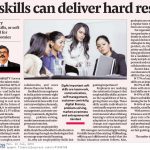Why 21st century employability skills, or soft skills, are critical for knowledge economies.

The Annual Employability Survey 2019 by Aspiring Minds, the talent evaluation company, has revealed that 80% of Indian engineers are not fit for any job in the knowledge economy—and India has 760 universities; it’s the third-largest higher education system in the world! The massive skills gap is going to cost us in more ways than one. While the future of these graduates is at risk, it is estimated the skills gap can cost India $1.97 trillion in GDP growth over the next decade.
Recent employer surveys by Wadhwani Foundation have also revealed a critical hiring differentiator—employers demand a lot more than just a degree. They are looking for specific employability (soft) skills that go a long way in contributing to workplace success in an environment that is more demanding, more complex, more collaborative, and more diverse than ever before.
Feedback from employers in India points towards eight employability skills as most critical and in tune with 21st century workplace demands, i.e. communication, self-management, customer centricity, teamwork, digital literacy, problem-solving, market awareness and entrepreneurial mindset.
These core employability skills should be embedded in all education and training through methodologies that encourage experiential learning.
So, why are employability skills fast gaining importance?
Employers are realising the substantial impact that employability skills can have on the capabilities of hires, giving them an edge. These skills enable individuals to continually acquire new-age trends in a dynamic business environment where lifelong learning is critical and quick adaptation to technological change and organisational restructuring is a must.
HR managers are increasingly looking for skills beyond the existing 3R (Reading, wRiting and aRithmetic) model that the Indian education system follows. Also, graduates are expected to be upskilling on a regular basis to transfer essential skills from one occupation to another.
For organisational efficiency, 21st century graduates need to function independently in roles that require problem-solving and decision-making. This may entail strategies to improve production, service, product, etc, through demonstrated creativity and flexibility in approach. Hence, being proficient in soft skills is important for a candidate/employee to be industry-ready and job-ready, with a range of interpersonal and managerial skills to improve collaboration and productivity.
Recent data insights from SkillSurvey corroborate to the rising influence of soft skills in the corporate world.
-77% of employers believe that soft skills are as important as hard ones;
-67% of HR managers will hire candidates with strong soft skills even if their hard skills are weak;
-43% of HR managers cite cultural fit (due to soft skills) as the single-most determining factor for a new hire;
-46% of new hires fail in the first 18-months, usually due to lack of soft skills.
With new technologies, global competitiveness and the redesign of the workplace into a flexible high-performance work environment, sector-agnostic core and professional skills to improve employability and expand career opportunities are fast gaining prominence.
Author: Atul Raja is executive vice-president, Wadhwani Foundation

